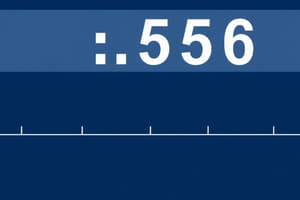Podcast
Questions and Answers
What is the weight of an object with a mass of 50 kg on Earth, where gravity is 9.8 , \text{m/s}^2?
What is the weight of an object with a mass of 50 kg on Earth, where gravity is 9.8 , \text{m/s}^2?
- 50 N
- 500 N
- 54 N
- 490 N (correct)
If a ball has a mass of 3 kg, what is the force acting on it while falling freely on Earth?
If a ball has a mass of 3 kg, what is the force acting on it while falling freely on Earth?
- 29.4 N (correct)
- 3 N
- 30 N
- 1.6 N
What is the mass of an object if its weight is 784 N on Earth?
What is the mass of an object if its weight is 784 N on Earth?
- 80 kg (correct)
- 90 kg
- 75 kg
- 100 kg
An astronaut weighs 60 kg on Earth. What would be the astronaut’s weight on Mars, where gravity is 3.7 , \text{m/s}^2?
An astronaut weighs 60 kg on Earth. What would be the astronaut’s weight on Mars, where gravity is 3.7 , \text{m/s}^2?
What is the gravitational acceleration on a planet if a spaceship weighing 720,000 N has a mass of 10,000 kg?
What is the gravitational acceleration on a planet if a spaceship weighing 720,000 N has a mass of 10,000 kg?
If Big Bertha has a weight of 1000 N on Earth, what is her mass?
If Big Bertha has a weight of 1000 N on Earth, what is her mass?
If an elevator can safely lift 400 kg and four individuals weigh 900 N, 700 N, 800 N, and 600 N, can the elevator lift them together?
If an elevator can safely lift 400 kg and four individuals weigh 900 N, 700 N, 800 N, and 600 N, can the elevator lift them together?
An object weighs 200 N on Earth. What would be its approximate mass on another planet with gravity of 4 , \text{m/s}^2?
An object weighs 200 N on Earth. What would be its approximate mass on another planet with gravity of 4 , \text{m/s}^2?
Flashcards
Weight
Weight
The force exerted on an object due to gravity.
Mass
Mass
The amount of matter in an object, measured in kilograms.
Earth's Gravity
Earth's Gravity
The acceleration due to gravity on Earth, approximately 9.8 meters per second squared.
Weight Formula
Weight Formula
Signup and view all the flashcards
Mass Formula
Mass Formula
Signup and view all the flashcards
Gravity
Gravity
Signup and view all the flashcards
Elevator Load Limit
Elevator Load Limit
Signup and view all the flashcards
Force
Force
Signup and view all the flashcards
Study Notes
Weight and Force Calculations
- Weight is a force calculated by multiplying mass by acceleration due to gravity (often represented as 9.8 m/s² on Earth).
- Formula: Weight = Mass × Gravity
- Units: Weight is measured in Newtons (N), mass in kilograms (kg), and gravity in meters per second squared (m/s²).
Calculating Weight from Mass
- Example: A 75 kg object on Earth has a weight of 735 N (75 kg × 9.8 m/s²).
Calculating Mass from Weight
- Formula: Mass = Weight ÷ Gravity
- Example: An object weighing 500 N has a mass of approximately 51 kg (500 N ÷ 9.8 m/s²).
Weight Variations with Gravity
- Weight changes depending on the acceleration due to gravity.
- Example: An astronaut with a mass of 75 kg has a weight of 120 N on the moon (75 kg × 1.6 m/s²).
Calculating Gravity from Weight and Mass
- Formula: Gravity = Weight ÷ Mass
- Example: A spaceship with a mass of 9000 kg and a weight of 390,000 N experiences a gravitational acceleration of 43.3 m/s².
Combined Weight Example (Elevator Problem)
- To determine if an elevator can lift multiple people, convert each person's weight to mass by dividing by 9.8 m/s², sum these masses, and then compare the total to the elevator's maximum capacity.
- Example: Four people with weights of 850 N, 530 N, 740 N, and 610 N have a combined mass of 278.5 kg. This is comfortably below a 300 kg limit, so the elevator can safely lift them.
Studying That Suits You
Use AI to generate personalized quizzes and flashcards to suit your learning preferences.




